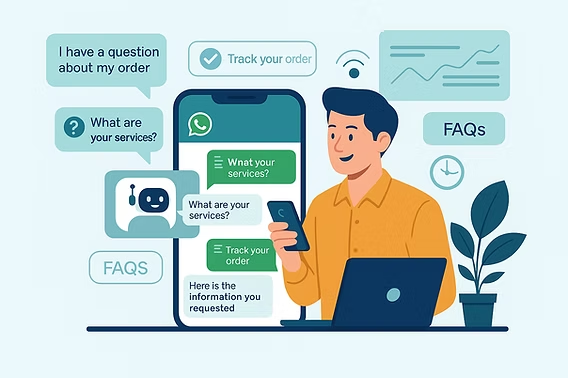Chatbots and Conversational AI: How They’re Changing Customer Support for SMEs
In 2025, customer support is no longer limited to call centers and email chains. With the rise of chatbots and conversational AI for SMEs, small and medium-sized businesses now have access to intelligent, scalable, and cost-effective support solutions that were once only available to large enterprises. These technologies are revolutionizing the way SMEs interact with their customers—offering faster response times, 24/7 availability, and personalized experiences.
This blog explores how chatbots and conversational AI are transforming customer service for SMEs and why integrating them into your business strategy in 2025 is a smart move.
What Are Chatbots and Conversational AI?
Before diving into their impact, let’s clarify the terms:
- Chatbots are software applications that simulate human-like conversations through text or voice interfaces. They’re commonly used on websites, apps, and messaging platforms to answer FAQs, guide users, or handle basic customer service tasks.
- Conversational AI goes beyond traditional chatbots. It uses advanced technologies like natural language processing (NLP) and machine learning (ML) to understand context, intent, and even emotion—allowing for more human-like, intelligent interactions.
Together, they create seamless, automated experiences that reduce the workload on human support teams and improve customer satisfaction.

Why SMEs Are Adopting Chatbots and Conversational AI in 2025
In the past, SMEs hesitated to adopt AI tools due to high costs and technical complexity. But in 2025, cloud-based platforms and affordable AI-as-a-service models have made this technology accessible and easy to integrate.
Key benefits for SMEs include:
- Reduced operational costs
- 24/7 customer support without extra staffing
- Instant response time
- Scalable customer service during peak hours
- Improved lead generation and sales automation
These advantages are driving rapid adoption of chatbots and conversational AI for SMEs across industries like e-commerce, healthcare, education, and professional services.
How Chatbots Improve Customer Support for SMEs
1. 24/7 Availability
Unlike human agents, chatbots don’t sleep. They provide real-time assistance round the clock, ensuring your customers get help whenever they need it—even after hours, on weekends, and during holidays.
2. Instant Response Times
Customers expect fast answers. Chatbots can instantly respond to routine questions, improving user satisfaction and reducing bounce rates.
3. Handling High Volume Inquiries
During product launches, campaigns, or seasonal sales, support teams can get overwhelmed. Chatbots scale automatically, handling multiple conversations at once without compromising quality.
4. Reducing Human Workload
By handling repetitive queries—like order tracking, store hours, or refund policies—chatbots free up your human agents to focus on complex, high-priority cases.
5. Cost-Effective Operations
Instead of hiring and training a large support team, SMEs can deploy chatbots at a fraction of the cost, reducing overhead while improving service.
Conversational AI: Taking It a Step Further
While chatbots are ideal for predefined responses, conversational AI introduces intelligence and personalization. Here’s how it enhances support:
1. Understanding Context and Intent
Conversational AI can understand the nuances of human speech, including slang, spelling errors, and multiple intents within a sentence. This enables it to provide more accurate responses.
2. Multi-Language Support
In 2025, AI-powered bots can handle conversations in multiple languages, allowing SMEs to serve global audiences without hiring multilingual staff.
3. Learning Over Time
With machine learning, conversational AI tools improve continuously. They learn from user interactions, becoming smarter and more efficient over time.
4. Seamless Integration
Modern conversational AI platforms integrate with CRMs, ecommerce platforms, and helpdesks—creating a unified customer view and enabling personalized support.
Popular Use Cases for SMEs in 2025
SMEs across industries are leveraging chatbots and conversational AI in practical ways:
- E-commerce: Order tracking, product recommendations, returns
- Healthcare: Appointment scheduling, patient FAQs, reminders
- Real estate: Property inquiries, appointment bookings
- Education: Student enrollment, FAQs, course information
- Financial services: Account queries, loan calculators, lead qualification
Challenges to Consider
Despite their advantages, these technologies are not without challenges:
- Initial setup and training require time and strategy.
- Over-reliance on bots without human fallback can frustrate users.
- Data privacy and security must be prioritized, especially when handling personal information.
That’s why it’s important to choose a platform that balances automation with human support and complies with relevant data protection regulations.

Best Practices for SMEs Implementing Chatbots in 2025
- Start Small: Begin with FAQs or lead generation, then expand functionality.
- Keep the Conversation Natural: Use a friendly tone and ensure the bot doesn’t sound robotic.
- Offer Human Escalation: Always provide an option to connect with a live agent when needed.
- Track and Optimize: Use analytics to understand user behavior and improve your chatbot’s performance.
- Ensure Mobile Optimization: Your bot should work seamlessly on mobile devices where most users interact.
The Future of Customer Support for SMEs
Looking ahead, AI-driven support is only going to grow more powerful. Voice bots, emotion detection, and hyper-personalized experiences will become standard. SMEs that embrace these tools now will gain a strong competitive edge in efficiency, customer satisfaction, and brand loyalty.
Conclusion
Chatbots and conversational AI for SMEs are no longer optional—they’re essential tools for modern customer service in 2025. They help small and medium businesses deliver enterprise-level support without the costs or complexity. From improving response times to increasing efficiency and customer satisfaction, the impact is clear.
If you’re an SME looking to scale your support without scaling your team, adopting conversational AI is a step in the right direction.



